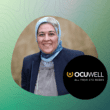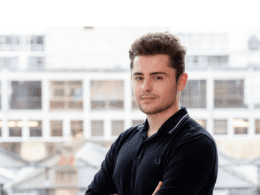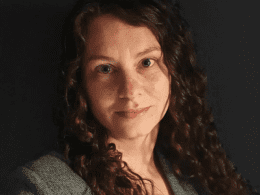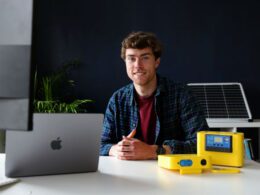In this interview, we’ll hear about Kaldi Financial Technology, a FinTech for Good scaleup in the UK working to transform the finances of Gen Z and Millennials by helping them to “save earlier and better”
Can you introduce yourself and tell us about your role?
Hi, I am the exited founder (via IPO) of a boutique financial services company, so this is my second venture. My job is to provide the strategic vision at Kaldi and ensure that we succeed in fulfilling our mission – to help young people save earlier and better.
We do this through financial education and by providing access to low-cost index funds. We then help our ‘accidental investors’ to seed those funds with rewards from our retail partners, which are auto-invested on their behalf as part of their day-to-day spending.
Our aim is to transform the investing landscape for people who either leave saving until it is too late, don’t save at all, or save carefully but in cash savings like bank accounts or cash ISAs and so miss out on all the capital growth that world stock markets provide.
How did your company come about and what was the motivation behind it?
Problems find entrepreneurs. Most start-ups are run by people who find they have this niggle that things could be done better. In my case, I was disappointed that in the UK there are so many people who are financially excluded and who could be leading much better lives with just a little bit of planning.
My business partner and I started unpicking the problem stage by stage. First, deal with the toxic tropes, like ‘the stock market is only for rich people’ or ‘it’s all about timing’. Then address the procrastination by providing funds which can be signed up for in minutes. Then deal with loss aversion by seeding those funds with free retail rewards.
Finally, educate people to get them where they need to be, which is a small amount of relevant knowledge, confidence that they can leave their investments to grow, and a bit of determination to add money here and there to reach their goals and live a better life as a result. That’s basically it.
Can you describe Kaldi’s mission and values?
The company’s mission is to address financial exclusion by tackling toxic tropes and willfully misleading advice. We want ordinary people to understand that saving small amounts of money every month in the stock market, from an early age, is entirely transformative. It is also entirely achievable for the vast majority of the British population.
“People’s financial resilience is being sapped by easy access to credit and not enough education about saving. Buy Now Pay Later preys on the least well-off.”
What are some of the most pressing social issues that Kaldi is working to address through its technology?
Only 8% of British adults have ever had any financial advice. This has so many negative social impacts. Ethnic minority UK citizens are two times more likely to have no savings at all than white UK citizens.
People’s financial resilience is being sapped by easy access to credit and not enough education about saving. Buy Now Pay Later preys on the least well-off.
Also, 75% (or more) of all retail accounts in the UK in Crypto, CFDs or Day Trading are loss-making. Vulnerable customers are involved in financial instruments which are not much better than a bet on the horses.
Additionally, 75% of middle-income UK savers are invested in Cash ISAs. Because of inflation, their savings are losing £17bn of spending power a year.
How does your company measure the impact of its work in creating positive change?
We will measure the impact of our work in the longer term by the number of surprised and happy ‘accidental savers’ we have created and the number of retailers who recognise that helping their loyal customers address their major financial life challenges can foster enduring loyalty.
In our case, an initial investment of just £20, followed by £20 of monthly cashback savings is enough to double the average person’s retirement savings or to boost their ordinary savings by enough to make home ownership a realistic option. So the stakes couldn’t be higher.
In your opinion, what impact will technology have in creating a better future?
There is always a dystopian side to technology. But in our everyday lives, the influences are unambiguously positive. Knowledge asymmetry has been one of the biggest drivers of social injustice. Whether you are an Indian rice farmer or a British shopper, you can compare prices or access far-away markets. Deeper markets = greater wealth through lower prices and more choice.
Communications will continue to be transformed. Not only does this bring the world closer together through a much better understanding of each other’s problems, but it also helps so much on a human level. You have only to think about the African kid who is teaching himself music on YouTube, via a ‘pennies a day’ wifi connection, or the gig economy worker far away from their family who can now speak to their children every day.
Medical advances mean that the world’s poorest people are now inoculated against diseases which still killed the world’s richest people less than 100 years ago. Technology allows people to live longer, happier, richer and better-informed lives.
What advice do you have for other companies looking to use tech for good and positively impact the world?
Keep your focus and don’t be disheartened by what is often a torturously steep and relentlessly long path! You don’t have to be Mother Teresa – the world revolves around profitable corporations – but don’t lose your social purpose along the way.
Also, actually do it. There seems to be a lot more ‘talking than walking’ in the world these days.










